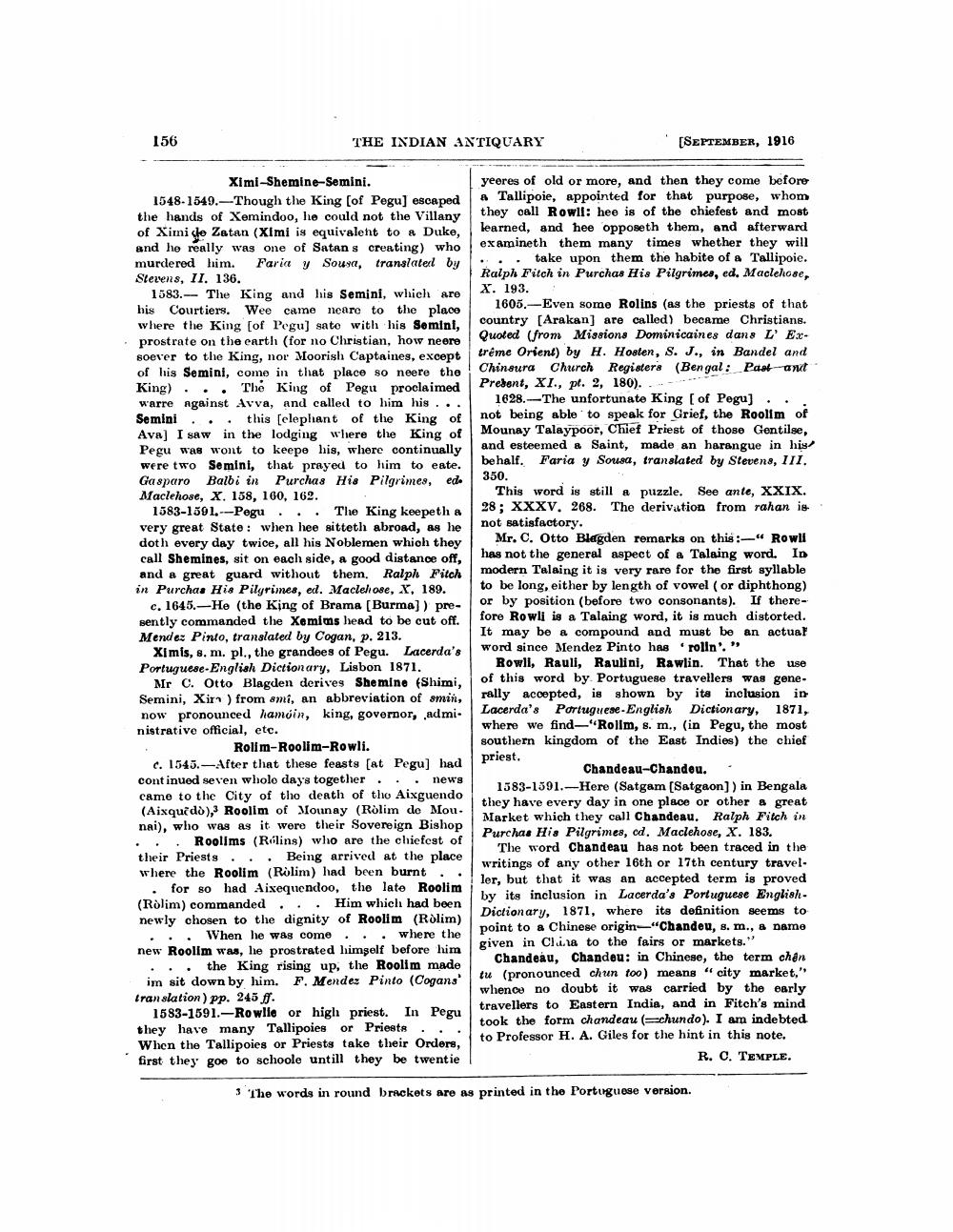________________
156
THE INDIAN ANTIQUARY
[SEPTEMBER, 1916
Ximi-Shemine-Semini. 1548-1549.-Though the King (of Pegu) escaped the hands of Xemindoo, he could not the Villany of Ximi clo Zetan (Ximi is equivalent to a Duke, and he really was one of Satan s creating) who murdered him. Faria y Sousa, translatel by Stevens, II. 136.
1583.- The King and his Semini, which are his Courtiers. Wee came neare to the place where the King [of Pegu) sate with his Semini, prostrate on the earth (for no Christian, how neere soever to the King, nor Moorish Captaines, except of his Semini, come in that place so neere the King) . .. The King of Pegut proclaimed warre Against Avva, and called to him his ... Semini ... this [elephant of the King of Ava) I saw in the lodging where the King of Pegu was wont to keepe his, where continually were two Semint, that prayed to him to eate. Gasparo Balbi in Purchas His Pilgrimes, edo Maclehose, X. 158, 160, 162.
1583-1591.--Pegu ... The King keepeth a very great Stato: when hee sitteth abroad, as he doth every day twice, all his Noblemen which they call Shemines, sit on each side, a good distance off, and a great guard without them. Ralph Fitch in Purchas His Pilyrimes, ed. Maclelose, X, 189.
c. 1645.-He (the King of Brama [Burma]) preBently commanded the Xemims head to be cut off. Mendez Pinto, translated by Cogan, p. 213.
Ximis, s. m. pl., the grandees of Pegu. Lacerda's Portuguese-English Dictionary, Lisbon 1871.
Mr C. Otto Blagden derive Shemine (Shimi, Semini, Xin ) from smi, an abbreviation of amin, now pronounced hamoin, king, governor, ,admi. nistrative official, etc.
Rolim-Roolim-Rowli. c. 1545.-After that these feasts (at Pegu) had continued seven wholo days together ... news came to the City of the death of tho Aixguendo (Aixquids), Roolim of Mounay (Rolim de Mou. nai), who was as it were their Sovereign Bishop . . . Roolims (Rolins) who are the chiefest of their Priests. Being arrived at the place where the Roolim (Rölim) had been burnt ..
• for so had Aixequendoo, the late Roolim (Rolim) commanded ... Him which had been newly chosen to the dignity of Roolim (Rolim)
... When he was come ... where the new Roolim was, le prostrated himself before him
... the King rising up, the Roolim made im sit down by him. F. Mendez Pinto (Cogans' Translation) pp. 245 ff.
1583-1591.-Rowlie or high priest. In Pegu they have many Tallipoies or Priests ... When the Tallipoies or Priests take their Orders, first they go to schoole untill they be twentie
yeeres of old or more, and then they come before & Tallipoie, appointed for that purpose, whom they call Rowll: hee is of the chiefest and most learned, and hee opposeth them, and afterward examineth them many times whether they will ... take upon them the habite of a Tallipoie. Ralph Fitch in Purchas His Pilgrimes, ed. Maclehose, X. 193.
1605.-Even some Rolins (as the priests of that country (Arakan) are called) became Christians. Quoted (from Missions Dominicaines dans L Ex. trême Orient) by H. Hosten, S. J., in Bandel and Chinsura Church Registers (Bengal : Pasta Prebent, XI., pl. 2, 180). ----
1628.--The unfortunate King of Pegu)... not being able to speak for Grief, the Roolim of Mounay Talaypoor, Chief Priest of those Gentilse, and esteemed & Saint, made an harangue in his behalf. Faria y Sousa, translated by Stevens, III. 350.
This word is still a puzzle. See ante, XXIX. 28; XXXV. 268. The derivation from rahan is not satisfactory.
Mr. C. Otto Blagden remarks on this:-" Rowll has not the general aspect of a Talaing word. In modern Talaing it is very rare for the first syllable to be long, either by length of vowel (or diphthong) or by position (before two consonants). If therefore Rowli is a Talaing word, it is much distorted. It may be a compound and must be an actual word since Mendez Pinto has rolln'."
Rowll, Rauli, Raulini, Rawlin. That the use of this word by Portuguese travellers was generally accepted, is shown by its inclusion in Lacerda's Portuguese-English Dictionary, 1871, where we find-'Rollm, s. m., (in Pegu, the most southern kingdom of the East Indies) the chief priest.
Chandeau-Chandou. 1583-1391.-Here (Satgam (Satgaon]) in Bengala they have every day in one place or other a great Market which they call Chandeau. Ralph Fitch in Purchas His Pilgrimes, ed. Maclehose, X. 183.
The word Chandeau has not been traced in the writings of any other 16th or 17th century travel. ler, but that it was an accepted term is proved by its inclusion in Lacerda's Portuguese English Dictionary, 1871, where its definition seems to point to a Chinese origin-"Chandeu, s. m., a namo given in China to the fairs or markets."
Chandeau, Chandou: in Chinese, the term chan tu (pronounced chun foo) means "city market." whence no doubt it was carried by the early travellers to Eastern India, and in Fitch's mind took the form chandeau (chundo). I am indebted to Professor H. A. Giles for the hint in this note.
R. C. TEMPLE.
The words in round brackets are as printed in the Portuguese version.




